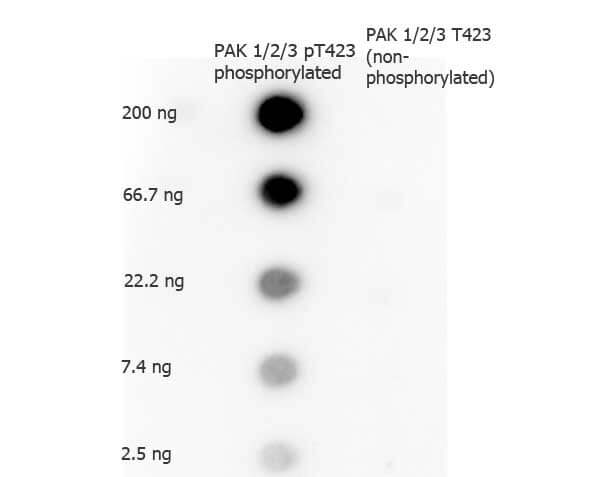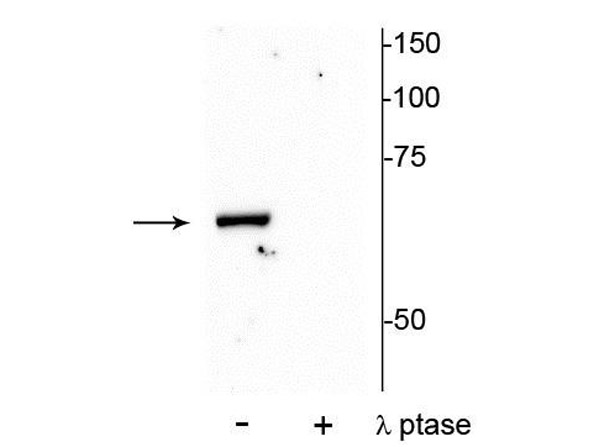Datasheet is currently unavailable. Try again or CONTACT US
PAK 1/2/3 phospho T423 Antibody
Rabbit Polyclonal
1 References
600-401-413
100 µg
Liquid (sterile filtered)
ELISA, Dot Blot
Human
Rabbit
Shipping info:
$50.00 to US & $70.00 to Canada for most products. Final costs are calculated at checkout.
Product Details
Anti-PAK 1/2/3 pT423 (RABBIT) Antibody - 600-401-413
rabbit anti-PAK pT423 antibody, rabbit anti-PAK1/2/3 pT423 antibody, PAK1, PAK-1, PAK 1, Alpha PAK, p21-activated kinase 1, p65-PAK, PAK2, PAK-2, PAK 2, PAK65, S6/H4 kinase, p21-activated kinase 2, p58, Gamma PAK, PAK3, PAK-3, PAK 3, Beta PAK, CDC42/RAC effector kinase PAK-B, p21-activated kinase 3
Rabbit
Polyclonal
IgG
Target Details
PAK1 - View All PAK1 Products
Human
Phosphorylation
Conjugated Peptide
Human PAK 1/2/3 phospho peptide corresponding to a region of the human protein conjugated to Keyhole Limpet Hemocyanin (KLH).
This affinity purified antibody is directed against human PAK (p21-GTPase Activated Protein Kinase). The product was affinity purified from monospecific antiserum by immunoaffinity purification. Antiserum was first purified against the phosphorylated form of the immunizing peptide. The resultant affinity purified antibody was then cross-adsorbed against the non-phosphorylated form of the immunizing peptide. This phospho specific polyclonal antibody is specific for phosphorylated pT423 of Human PAK 1/2/3. Reactivity with non-phosphorylated PAK 1/2/3 is less than 1% by ELISA. Cross reactivity with PAK 1/2/3 from other species has not been determined.
Application Details
Dot Blot, ELISA
This phospho specific polyclonal antibody was tested by Dot blot and ELISA and was found to be reactive with the phosphorylated form of the immunizing peptide and minimally reactive with the non-phosphorylated form of the immunizing peptide. Although not tested, this antibody is likely functional in immunohistochemistry, immunoblotting, and immunoprecipitation. Lysates from Jurkat cells or PAK transfected cells may be used as a control. This product has been assayed against 0.1 µg of phosphorylated peptide in a standard capture ELISA using TMB (3,3',5,5'-Tetramethylbenizidine) code # TMBE-100 as a substrate for 30 minutes at room temperature. A working dilution of 1:5,000 to 1:25,000 is suggested for this product. Less than 0.2% cross-reactivity was detected against the non-phosphorylated form of the immunizing peptide. Researchers should determine optimal titers for other applications.
Formulation
1.0 mg/mL by UV absorbance at 280 nm
0.02 M Potassium Phosphate, 0.15 M Sodium Chloride, pH 7.2
0.01% (w/v) Sodium Azide
None
Shipping & Handling
Dry Ice
Store vial at -20° C prior to opening. Aliquot contents and freeze at -20° C or below for extended storage. Avoid cycles of freezing and thawing. Centrifuge product if not completely clear after standing at room temperature. This product is stable for several weeks at 4° C as an undiluted liquid. Dilute only prior to immediate use.
Expiration date is one (1) year from date of receipt.
The p21-activated kinases (PAKs) are a family of multifunctional serine/threonine kinases involved in a variety of cell functions including stress response, apoptosis and regulation of cell motility and tumor metastasis. Mammalian PAKs are called 1, 2, 3 or a, g, b respectively. PAKs are part of a large family of kinases where the catalytic domain of the kinase is related to Ste20 kinase of S. cerevisiae. Pak activity is regulated by specific binding of GTP-bound Rac and cdc42 GTPases and also by sphingosine and related lipids. PAK1 activation is induced by a variety of growth factors and G-protein-coupled receptors, Fc receptors, and integrins. This antibody is specific for the phosphorylated form of PAK 1/2/3. The selected peptide sequence used to generate the polyclonal antibody is common to all human PAKs.
Gerassy-Vainberg S et al. (2024). A personalized network framework reveals predictive axis of anti-TNF response across diseases. Cell Rep Med.
Applications
Other
This product is for research use only and is not intended for therapeutic or diagnostic applications. Please contact a technical service representative for more information. All products of animal origin manufactured by Rockland Immunochemicals are derived from starting materials of North American origin. Collection was performed in United States Department of Agriculture (USDA) inspected facilities and all materials have been inspected and certified to be free of disease and suitable for exportation. All properties listed are typical characteristics and are not specifications. All suggestions and data are offered in good faith but without guarantee as conditions and methods of use of our products are beyond our control. All claims must be made within 30 days following the date of delivery. The prospective user must determine the suitability of our materials before adopting them on a commercial scale. Suggested uses of our products are not recommendations to use our products in violation of any patent or as a license under any patent of Rockland Immunochemicals, Inc. If you require a commercial license to use this material and do not have one, then return this material, unopened to: Rockland Inc., P.O. BOX 5199, Limerick, Pennsylvania, USA.


